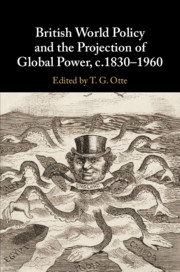Book contents
- British World Policy and the Projection of Global Power, c.1830–1960
- British World Policy and the Projection of Global Power, c.1830–1960
- Copyright page
- Dedication
- Contents
- Notes on the Contributors
- Preface and Acknowledgements
- Introduction: British World Policy and the White Queen’s Memory
- 1 The War Trade Intelligence Department and British Economic Warfare during the First World War
- 2 The British Empire and the Meaning of ‘Minimum Force Necessary’ in Colonial Counter-Insurgencies Operations, c.1857–1967
- 3 Yokohama for the British in the Late Nineteenth Century: A Hub for Imperial Defence and a Node of Influence for Change
- 4 ‘The Diplomatic Digestive Organ’: The Foreign Office As the Nerve Centre of Foreign Policy, c.1800–1940
- 5 Financial and Commercial Networks between Great Britain and South America during the Long Nineteenth Century
- 6 Britain through Russian Eyes: 1900–1914
- 7 Imperial Germany’s Naval Challenge and the Renewal of British Power
- 8 Views of War, 1914 and 1939: Second Thoughts
- 9 The Ambassadors, 1919–1939
- 10 The Tattered Ties that Bind: The Imperial General Staff and the Dominions, 1919–1939
- 11 Seeking a Family Consensus? Anglo-Dominion Relations and the Failed Imperial Conference of 1941
- 12 Imperial Hubs and their Limitations: British Assessments of Imposing Sanctions on Japan, 1937
- Index
2 - The British Empire and the Meaning of ‘Minimum Force Necessary’ in Colonial Counter-Insurgencies Operations, c.1857–1967
Published online by Cambridge University Press: 06 September 2019
- British World Policy and the Projection of Global Power, c.1830–1960
- British World Policy and the Projection of Global Power, c.1830–1960
- Copyright page
- Dedication
- Contents
- Notes on the Contributors
- Preface and Acknowledgements
- Introduction: British World Policy and the White Queen’s Memory
- 1 The War Trade Intelligence Department and British Economic Warfare during the First World War
- 2 The British Empire and the Meaning of ‘Minimum Force Necessary’ in Colonial Counter-Insurgencies Operations, c.1857–1967
- 3 Yokohama for the British in the Late Nineteenth Century: A Hub for Imperial Defence and a Node of Influence for Change
- 4 ‘The Diplomatic Digestive Organ’: The Foreign Office As the Nerve Centre of Foreign Policy, c.1800–1940
- 5 Financial and Commercial Networks between Great Britain and South America during the Long Nineteenth Century
- 6 Britain through Russian Eyes: 1900–1914
- 7 Imperial Germany’s Naval Challenge and the Renewal of British Power
- 8 Views of War, 1914 and 1939: Second Thoughts
- 9 The Ambassadors, 1919–1939
- 10 The Tattered Ties that Bind: The Imperial General Staff and the Dominions, 1919–1939
- 11 Seeking a Family Consensus? Anglo-Dominion Relations and the Failed Imperial Conference of 1941
- 12 Imperial Hubs and their Limitations: British Assessments of Imposing Sanctions on Japan, 1937
- Index
Summary
Britain’s position as a global power from the middle of the nineteenth century onwards was challenged from two directions. External enemies, principally Russia, France and Germany, emerged as increasingly powerful rivals. Internally disparate groups of nationalists coalesced at different times and in different places to try to subvert British rule. By the middle of the twentieth century these two forces united to help undercut the props that had sustained the empire, with the result that between 1945 and 1970 the British shed most of their remaining colonial responsibilities. But in doing so they also developed a narrative of colonialism that explained both how they had governed their empire, and why they were willing to surrender it. Britain’s imperial mission was to bring the rule of law and good governance to peoples who would not otherwise have enjoyed such benefits. To accomplish that mission they had ruled their empire with the maximum of political cajolery and the minimum of physical force. This story was not entirely a myth.
- Type
- Chapter
- Information
- Publisher: Cambridge University PressPrint publication year: 2019
- 1
- Cited by



